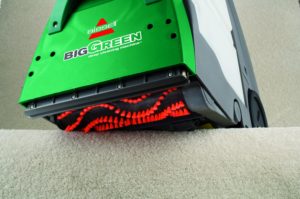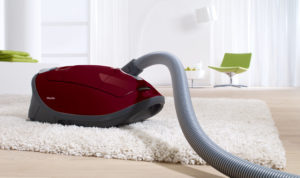
It’s easy to spend a lot of money on carpeting if you don’t know what’s important and what’s not. Even though carpet can cost less per square foot than a range of bare floor options, costs add up quickly and the idea that “you get what you pay for” is true to some degree. However, with a bit of carpet knowledge, you can figure out where to cut costs and where you want to let go of the purse strings a bit for long-term benefits. Today we’ll take a look at three areas where you’ll want to save money and two where you’ll want to spend more when choosing a residential carpet.
1. Wait for fall carpet promotions before buying from a retailer
If you’re going to buy your carpet from a brick-and-mortar retailer, your best bet will be to buy it during the fall, and specifically between October and December. The biggest names in the industry use the fall as a clearance season to move old inventory before introducing new styles and piles in the spring. Carpeting, like lawn care, is a seasonal industry, as people are more likely to think of it during warming (as opposed to cooling) weather. If you can wait to buy a carpet until fall or winter, you’ll typically get better prices than if you buy it in the spring or summer. That said, if you need a carpet in a hurry, there are almost always some ongoing sails throughout the year, especially when retailers (as opposed to manufacturers) are running sales. Prices will also drop somewhat between spring and summer as business slows down.
2. Only buy the quality levels you need for each part of your home
When buying carpets, take advantage of the facts that a.) carpet manufacturers typically sell the same product lines in a tiered quality format (e.g., good, better, and best), and that b.) you don’t need the same grade throughout your home.
Regarding the first point, you’ll often see certain carpets (e.g., saxonies) with three face weights in the product line (e.g., 30 oz., 50 oz., and 70 oz.). The remaining carpet properties will be identical, including the style, the dye method, fiber type, and warranty coverage. Choosing the grade you need allows you to take advantage of the second fact: different areas in your home will have different quality requirements.
For example, stairs and hallways typically generate the highest foot traffic in a home, and will as a result need the highest grade carpet to last a good amount of time. Your family or living room will have slightly lower requirements, because although people spend time there, there’s less motion. A basement, nursery, or bedroom will often have the lowest requirements due to the least foot traffic. Use your knowledge to save money where you can and spend where you need to.
3. Don’t buy a more expensive fiber than you actually need
Along with being savvy about carpet quality, get to know your fibers–synthetic and natural. If you want a good synthetic fiber, nylon will give you the greatest durability and resiliency. However, it’ll also cost you the most per square foot. If you don’t need as much durability, consider alternatives like polyester, which, aside from being cheaper, have other benefits, such as increased stain resistance and ecological friendliness.
The kind of carpet style you’re interested in will also affect your fiber options to some degree. For example, olefin (polypropylene) is a good nylon alternative for berber carpets, as it’s stronger and more durable when looped, such as in a berber style. Olefin is also a naturally colorfast and stain-resistant fiber, and works well for carpets that will receive a lot of sunlight.
Triexta is a new, high-durability fiber that’s touted as a serious alternative to nylon for resilience. Price-wise, it falls between polyester and nylon and is quickly gaining a following.
4…but don’t skimp out on the underpad (or, choose a good carpet cushion)
While you can save money in the various areas above, you don’t want to cut corners when it comes to your carpet’s cushioning. A weak or too-thin pad will lead to premature wear in your carpet, which will lead to you replacing your carpet on a shorter time-frame, ultimately costing you money instead of saving it.
5. Leave carpet installation to the pros
While it’s technically possible to install carpet on your own without professional help, if you don’t have a lot of experience (or know someone who does), you can quickly run into trouble. In the worst case scenarios, we’ve seen people who’ve needed to replace the entire carpet in addition to having it professionally installed. In the long term, you’re better off simply paying the money to have a professional job done. A professional will also be there to absorb costs if anything goes awry. And of course, many carpet warranties will explicitly note that a professional installation is the only way to secure coverage down the line.
6 & 7. Protect your investment a good carpet cleaner and back it up with a good vacuum

We’re going to combine the last two tips into one theme because they reflect the same idea: it’s not worth trying to save money on carpeting if you don’t clean and maintain it properly, as you’ll simply end up replacing it more quickly than necessary. Aim for at least weekly vacuuming sessions and quarterly deep cleanings (i.e., every three months) to keep your carpet fibers healthy and reduce the odds of staining and soiling permanently damaging your carpeting.

For carpet cleaning, we recommend the Bissell 86T3 Big Green. As we’ve noted in our reviews, it’s probably the best investment you can make in a carpet for under $1,000. For vacuuming, two of our top picks are the Miele Complete C3 Soft Carpet (reviewed here, here, and here) and the Miele Compact C2 Electro+ (reviewed here and here). Both have established track records and are buy-it-for-life machines you’ll probably be able to pass on to your children.
![]() You can buy the Bissell 85T3 Big Green carpet cleaner here on Amazon. You can buy the Miele Complete C3 Soft Carpet here or buy the Miele Compact C2 Electro+ here.
You can buy the Bissell 85T3 Big Green carpet cleaner here on Amazon. You can buy the Miele Complete C3 Soft Carpet here or buy the Miele Compact C2 Electro+ here.
![]() Canadians can buy the Miele Soft Carpet here, the Compact Electro+ here, and the Bissell Big Green here.
Canadians can buy the Miele Soft Carpet here, the Compact Electro+ here, and the Bissell Big Green here.
 If you find our research on PMC helpful, you can follow our efforts to keep maniacally reviewing home cleaning tools by shopping through our links above. We promise to keep fighting the good fight against every horror children, animals, and grown, yet messy humans can inflict upon a clean home.
If you find our research on PMC helpful, you can follow our efforts to keep maniacally reviewing home cleaning tools by shopping through our links above. We promise to keep fighting the good fight against every horror children, animals, and grown, yet messy humans can inflict upon a clean home.

